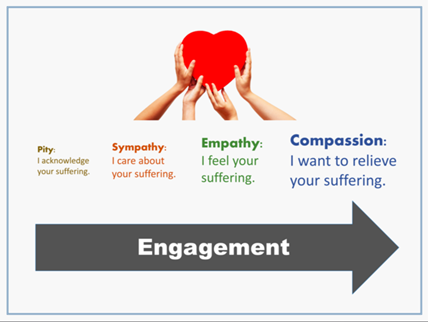
Patients will seek advice and care from a healthcare professional to address their current complaints and symptoms. Healthcare professionals are extremely knowledgeable in their own respective fields. However, being knowledgeable may not be enough to help guide patients during their individualized episode of care.
Patients want answers and certainty. Yes, this is very important so patients can feel more comfortable about their own situation. But it is also important to consider how and what the patient is experiencing. Patients not only present with physical symptoms, but they can also experience emotional symptoms, and others as well.
Patients may be depressed, stressed, feeling anxiety, fearful, among many other things. So, we must learn how to use our skills to create an environment, in which will help the patient stay motivated and positively engaged in their episode of care.
What is Compassion?
Compassion is when a healthcare professional is understanding and engaged in the patient’s current situation. Compassion can be different from sympathy or even empathy. Being sympathetic or empathetic isn’t a bad thing, but maybe there is more we can do to address the needs of our patients. This is illustrated below:1

(Source: Robert Shelton)1
Compassion is more inclusive and allows the patient as well as the clinician to establish a true therapeutic alliance. The ongoing engagement creates a positive and therapeutic atmosphere. This becomes the driving force to help guide patients to achieve meaningful clinical outcomes and understand how to utilize a self-management program to manage their symptoms.
Being compassionate is helpful to ensure you are in tune with your patient and are collectively working together. This leads to shared decision making, in which can be very empowering to the patient. This provides an improved outlook on their rehabilitation process, and ultimately can improve experiences with episodes of care in the future.
“Compassion. It’s not just a word. It’s a way of being. It’s not just a concept. Its love in action” ~ Jeff Brown
Article Written By Eric Trauber, PT, DPT, OCS, CSCS, FAAOMPT
References:
- Burton, N. Empathy vs. sympathy. Psychology today, May 22, 2015. Retrieved from https://www.psychologytoday.com/us/blog/hide-and-seek/201505/empathy-vs-sympathy.

 View Cart (0)
View Cart (0)
